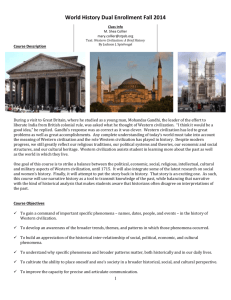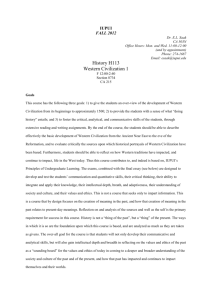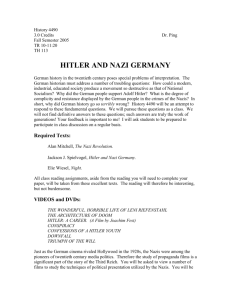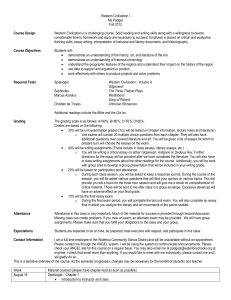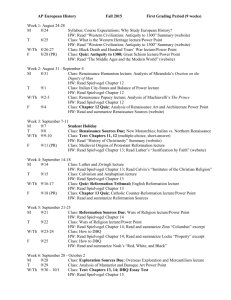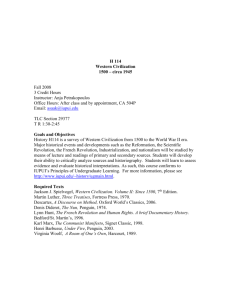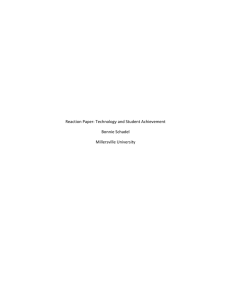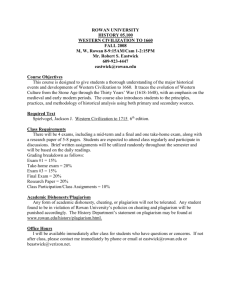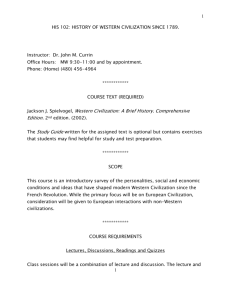history 1110 final review - Southern Utah University
advertisement
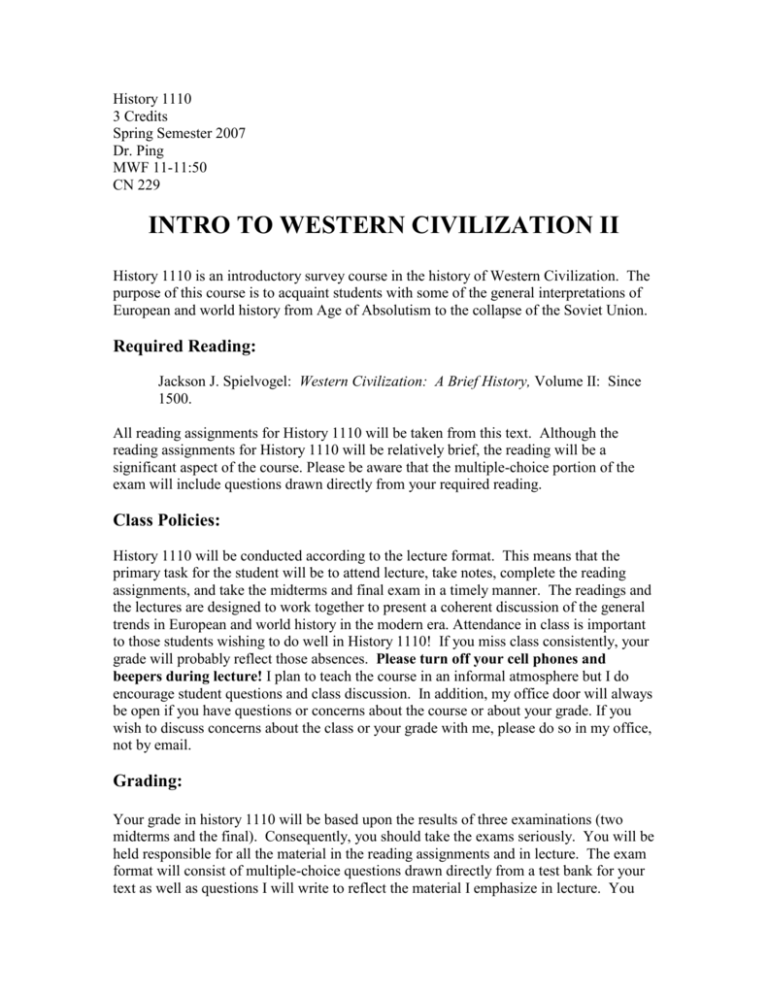
History 1110 3 Credits Spring Semester 2007 Dr. Ping MWF 11-11:50 CN 229 INTRO TO WESTERN CIVILIZATION II History 1110 is an introductory survey course in the history of Western Civilization. The purpose of this course is to acquaint students with some of the general interpretations of European and world history from Age of Absolutism to the collapse of the Soviet Union. Required Reading: Jackson J. Spielvogel: Western Civilization: A Brief History, Volume II: Since 1500. All reading assignments for History 1110 will be taken from this text. Although the reading assignments for History 1110 will be relatively brief, the reading will be a significant aspect of the course. Please be aware that the multiple-choice portion of the exam will include questions drawn directly from your required reading. Class Policies: History 1110 will be conducted according to the lecture format. This means that the primary task for the student will be to attend lecture, take notes, complete the reading assignments, and take the midterms and final exam in a timely manner. The readings and the lectures are designed to work together to present a coherent discussion of the general trends in European and world history in the modern era. Attendance in class is important to those students wishing to do well in History 1110! If you miss class consistently, your grade will probably reflect those absences. Please turn off your cell phones and beepers during lecture! I plan to teach the course in an informal atmosphere but I do encourage student questions and class discussion. In addition, my office door will always be open if you have questions or concerns about the course or about your grade. If you wish to discuss concerns about the class or your grade with me, please do so in my office, not by email. Grading: Your grade in history 1110 will be based upon the results of three examinations (two midterms and the final). Consequently, you should take the exams seriously. You will be held responsible for all the material in the reading assignments and in lecture. The exam format will consist of multiple-choice questions drawn directly from a test bank for your text as well as questions I will write to reflect the material I emphasize in lecture. You 2 will find a study guide for all three exams included in this syllabus. There may or may not be a formal in-class review before each exam. The midterms and the final exams are scheduled as follows: First Midterm: Friday, February 16. Second Midterm: Friday, March 23. Final Examination: (Day 1, Tuesday, May 1 @ 11:00 AM.) If you miss an exam it will be your responsibility to arrange for a make-up! In assigning your final grade, I will take improvement into account. Make-up exams will be given only in cases of illness or emergency. Please plan on taking the final exam when scheduled! No early or late finals will be offered except in cases of emergency. There are no papers or book reviews required for History 1110. Course Instructor: Larry L. Ping, Ph.D. Professor of History Office: (435) 585-5457 Fax: (435) 865-8193 E-Mail: ping@suu.edu Office Hours: 10:00-11:00AM DAILY Centrum 225K X5457 ADA Disclaimer: Students with medical, psychological, learning or other disabilities desiring academic adjustments, accommodations or auxiliary aids will need to contact the Southern Utah University Coordinator of Services for Students with Disabilities (SDD), in Room 206F of the Sharwan Smith Center or phone (435) 865-8022. SDD determines eligibility for and authorizes the provision of services. Academic Integrity: Scholastic dishonesty will not be tolerated and will be prosecuted to the fullest extent. You are expected to have read and understood the current issue of the student handbook (published by Student Services) regarding student responsibilities 3 and rights, and the intellectual property policy, for information about procedures and about what constitutes acceptable on-campus behavior. Information contained in this syllabus, other than the grading, late assignments, makeup work, and attendance policies may be subject to change with advance notice, as deemed appropriate by the instructor. Class Outcome/Objectives: The purpose of a Western Civilization course like History 1110 is to help students to think critically and to approach the problem of historical causation in that spirit. In addition, History 1110 is designed to give students an opportunity to develop their writing skills for college essay examinations. Henry Ford once said “History is just one damn thing after another.” He was right. Therefore, it is important that students recognize that history is not merely a collection of dry facts to be memorized, but rather a series of arguments among various schools of thought to explain the development of the modern world. In this course I will emphasize the following general themes: 1. The changing relationship of the individual to the state and the development of the modern concept of the citizen as well as the development of civil and political liberties. 2. The growth of an industrial secular society. 3. The emergence of Western Europe as the dominant center of economic, scientific, and imperial growth. Within this general framework, I will discuss the French and Industrial revolutions, nationalism, imperialism, gender issues, and what social Scientists call the Great Transformation: the coming of industrial society and modern consciousness. We will spend considerable time discussing the political upheavals of the Twentieth Century: the World Wars, fascism, the Russian Revolution, and the Cold War. Class Schedule, General Lecture Topics, and Reading Assignments: WEEK 1: Introduction to the course. John Locke and the English Political System. European Rivalries and the American Revolution. Spielvogel, Chapter 15. WEEK 2: The Enlightenment and Voltaire. Enlightened Absolutism in France. Prelude to Revolution in France. Spielvogel, Chapters 17 and 18. Monday, Jan. 15th, Martin Luther King Jr. Recess. WEEK 3: The French Revolution and Napoleon. Spielvogel, Chapter 19. 4 WEEK 4: Great Britain and the Industrial World. Spielvogel, Chapter 20. WEEK 5: Industrial Society and Political Change. Spielvogel, Chapter 21. Midterm Review. WEEK 6: Review and Midterm I: Friday, February 16. WEEK 7: No class Monday, February 19, President’s Day recess. Victorian Britain, Napoleon III, Karl Marx and the Age of Realism: Spielvogel, Chapter 22 . WEEK 8: Nineteenth Century European Thought: Darwin and Social Darwinism. Spielvogel, Chapter 23. WEEK 9: Imperial Germany, International Crises, and the New Imperialism. Spielvogel, Chapter 24. WEEK 10: The Modern Age: Freud and the First World War. Europe Between the Wars: The Great Depression and the Soviet Experiment. Spielvogel, Chapter 25. WEEK 11: March 12-16. Spring Recess. WEEK 12:. March 23. Spielvogel, Chapter 26. Nazi Germany. Midterm II, Friday, WEEK 13: The Second World War. Postwar Europe. Spielvogel, Chapter 27. WEEK 14: The Soviet-American Rivalry: The Cold War. Spielvogel, Chapter 28. WEEK 15: The Collapse of the Soviet Union and a New Europe. Spielvogel, Chapter 29. WEEK 16: Cultural Currents and Review. Final Examination: (Day 1, Tuesday, May 1 @ 11:00 AM.) 5 STUDY ITEMS FOR THE HISTORY 1110 MIDTERM I You may expect multiple-choice questions based upon the following topics: The Enlightenment Voltaire Origins of the French Revolution Napoleon Bonaparte Industrial Revolution Poor Law of 1834 Urban and working conditions in the Early Industrial Rev Industrial technology Charles Dickens James Watt and the steam engine Napoleonic Code Karl Marx and Marxism Essay topics: 1. What political and social problems led to the French Revolution? 2. What are the chief ideas of Marxism? What importance did Marx ascribe to economic forces and "class struggle?" 3. What is the meaning and significance of laissez-faire economics? HISTORY 1110 MIDTERM REVIEW II Please be prepared for multiple-choice questions on the following: The New Imperialism Economic critique of imperialism justifications for imperialism Charles Darwin Social Darwinism Otto von Bismarck and German Unification Imperial Germany Victorian family Women’s movement and the vote Schlieffen Plan and World War I Trench Warfare Treaty of Versailles 6 Russian Revolution Lenin Stalin Postwar conditions in Germany/Inflation Hitler and the growth of the Nazi Party Possible Essays: How do you account for the popularity of Hitler and the Nazis? Why did the Treaty of Versailles fail? Who was Lenin and what is his place in history? Why did the Weimar republic fail to produce a lasting democratic system in Germany? HISTORY 1110 FINAL REVIEW Hitler and the Nazi Party Hitler’s foreign policy goals Appeasement Munich Conference, 1938 Winston Churchill World War II Battle of Britain D-Day the Holocaust the Atomic bomb Marshall Plan Origins of the Cold War Berlin Wall Cuban Missile Crisis Soviet collapse Mikhail Gorbachev Please be prepared to discuss the following essay topics: 1. What was the Cold War? Who started it? Who won? 2. Why did the Soviet Union collapse? 3. Who was Mikhail Gorbachev and what is his place in history? 7
